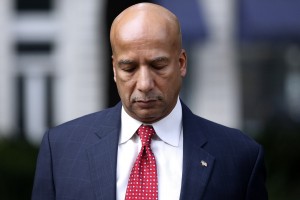Ray Nagin, the ex-mayor of New Orleans has gone to jail. They gave him 10 years and ordered him to pay restitution of $82,000. There are many in the prosecutor’s offices who feel the jail time and the fines are way too low.
 In an article entitled: “Ex-New Orleans mayor Ray Nagin sentenced to 10 years,” by Paul Murphy and Mike Perlstein of WWL-TV, New Orleans (July 9, 2014), Nagin, who is known as the face of Hurricane Katrina, did his best to sell out the city.
In an article entitled: “Ex-New Orleans mayor Ray Nagin sentenced to 10 years,” by Paul Murphy and Mike Perlstein of WWL-TV, New Orleans (July 9, 2014), Nagin, who is known as the face of Hurricane Katrina, did his best to sell out the city.
“’What Ray Nagin did was sell his office over and over and over again,’” Assistant U.S. Attorney Matthew Coman said outside the courthouse. “’The damage that Ray Nagin inflicted upon this community … is incalculable. We as a community need not and should not accept public corruption.’”
According to the article:
“A jury convicted Nagin of accepting hundreds of thousands of dollars in bribes — money, free vacation trips and truckloads of free granite for his family business — from businessmen who wanted work from the city or Nagin’s support for various hurricane recovery projects.”
Although it has been calculated that Nagin lined his pockets with more than a half-million dollars, at the time of his sentencing the family said they were virtually penniless. I am not a prosecutor; I don’t have an army of investigators to research the hidden treasures of the Nagin family; from an ethical standpoint, New Orleans was sold out and was made all the more poor.
Kicked when down
The damage done by Hurricane Katrina to New Orleans was catastrophic. Lives were lost, thousands of homes were lost, and the infrastructure of most of the city was lost. Many people had to move; many had to make do with whatever they had.
The one thing that was not lost was the heart and soul of the city. Nagin did his best to kill it. For at a time when the city needed to come together, when local business and enterprise and entrepreneurism needed to flourish, the former mayor was awarding bids to anyone who paid him. The “small guy” never had a chance. The small guy could not compete.
What was telling is that he not only accepted cash awards and free trips, but thousands of dollars of granite for his personal business. He made out in many ways and all of it on the backs of citizens who had lost everything. Of all the crimes he committed, my ethical take on it was one of indifference. His people needed him; other than photo-ops and speeches, he used them.
It was unforgiveable.
What the mayor taught us
There is always a sliver of optimism that we might find in the vey darkest of circumstances. Certainly, in the case of Ray Nagin we see that sooner or later the justice system works.
However, there is a much bigger and much more important issue. What the mayor taught us was the absolute importance of ethical training at local, regional and national political levels. New Orleans is not a small town or village; it is a major city. We tend to think of larger cities as having more checks and balances; they don’t. The opportunities for poor decisions are greater as is the opportunity for abuse.
An ethical framework that is solidly in place may not prevent fraud completely however, it will leave no doubt as to what is expected and what will result in a removal from office. Politicians who are held to an ethical standard will be judged against that standard.
When ex-mayor Nagin emerges from prison, I hope he finds New Orleans a changed place. I am optimistic the ex-mayor will be a changed person as well.

